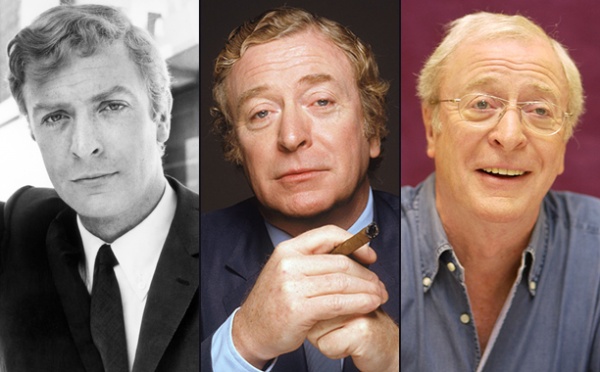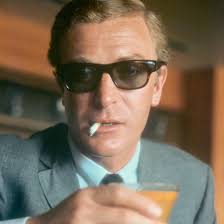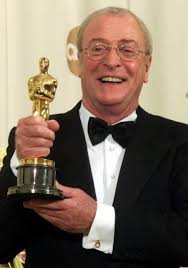Once Upon a Michael Caine
Posted by Deirdre | Filed under Blog

‘I don’t have any method,”Michael Caine says in his thick Cockney accent. “The only method I have is what I call the mirror method. When you look at me you should see yourself.”
That mirror was polished to a high sheen as Caine sat prettily in an expensive set of rooms at Toronto’s Four Seasons Hotel. He was in town to promote Little Voice, which premiered at the Toronto International Film Festival in 1998. On this day he wore a tailored dark-blue suit (very Savile Row) and a pair of gold-frame glasses. In his breast pocket was a packet of cigarillos, and he sneaked into the marble-tiled bathroom to smoke one. Or two. Or three.
If on screen he portrays the common man, in real life he’s every inch the working-class aristocrat.
Celebrated for playing underclass and underworld characters in many of the more than 70 films made over a 35-year career, Caine is beloved by millions who see their daily struggles mirrored in his average-guy persona. In Little Voice,Caine again plays an ordinary bloke who fights a losing battle with destiny. Even if you can’t identify with the character, you can at least sympathize.
Caine’s usually understated and anti-intellectual approach makes most of his roles seem people-friendly. It’s a rare skill. And Caine — who recently turned 65 — makes it look easy, perhaps too easy for his own good: “I’ve played everything from transvestite psychopaths to Nazi officers and I’ve received reviews that say he played himself again.”
Some characters, like Ray Say, the oily impresario he plays in Little Voice,are familiar. “I never knew any blokes like that from my real background,” he said. “The only time I met guys like him was when I came into show business at the very bottom echelon. The old bottom feeders. They were the guys. And I knew them well.”
But once he started achieving success — his first big break came in Cy Endfield’s 1964 epic Zulu, followed by starring roles in The Ipcress File (1965) and Alfie (1966) — the Ray Says of this world quickly receded into the background. Bottom feeders were replaced by top dogs like former roommate Terence Stamp and drinking buddies Richard Harris, Richard Burton and Peter O’Toole.
Caine came of age — professionally speaking — in the swinging London of the sixties. He and his cohorts were self-styled class warriors who epitomized the times. Caine, in particular, became a master at playing the working-class hero who makes good — and it’s a role that remains close to his heart, not least because of his own humble origins.

His real name, in fact, is Maurice Joseph Micklewhite Jr. and he was born in London on March 14, 1933, to a charwoman and a porter at London’s Billingsgate Fish Market. (Caine got his stage name from a Leicester Square marquee advertising the film The Caine Mutiny.)
With his younger brother Stanley (later the actor Stanley Hunter), Caine was enrolled in England’s child-evacuation program during the Second World War, which sent children to live with families in areas that were less likely to be bombed by theLuftwaffe. Caine came under the care of a policeman’s wife who beat him and fed him one can of fish a day. A watchful teacher noticed the bruises on his legs and the signs of malnutrition and called the Royal Society for Prevention of Cruelty to Children. Caine was eventually returned to his mother, who then beat up the other woman for abusing her child.
Caine’s father, meanwhile, apprenticed his son at Billingsgate. But Caine didn’t see his destiny wrapped up with frozen fish. A pastor who ran an after-school program for the disadvantaged children of Caine’s notorious Elephant and Castle neighbourhood first introduced the boy to literature and community drama. Caine became a voracious reader, using fiction as a form of escape. He came to view the theatre in the same way.

Although he jokes that he went into the theatre as a way to meet girls (his first wife was a London actress with whom he had a daughter, Dominique), the profession became his ticket out of the slums.
Thanks to acting, today Caine is a wealthy man who takes tea with the Queen. He is on a first-name basis with Margaret Thatcher, whose Tory politics dovetailed nicely with Caine’s up-by-the-bootstraps/self-made-man brand of conservatism, while his wife of the last 25 years is a former Miss Guyana. Caine also owns high-end restaurants in London and Miami as well as several expensive houses filled with antiques, fine art and vintage wine.
Are these things reminders or indices of just how far he has come? “No,” he said, not missing a beat. “If you see something and you think it’s beautiful for your home, you buy it because you want it to give you a jolt of positive pleasure. That’s what it’s about.”
Caine takes none of what he has achieved or what he possesses for granted.
“Whenever anyone asks me if I think I’m lucky, I think of Gregory Peck. He once said, ‘Yes, I’ve been very lucky. The harder I’ve worked, the luckier I’ve got.’ I think that’s the answer to that question.”
